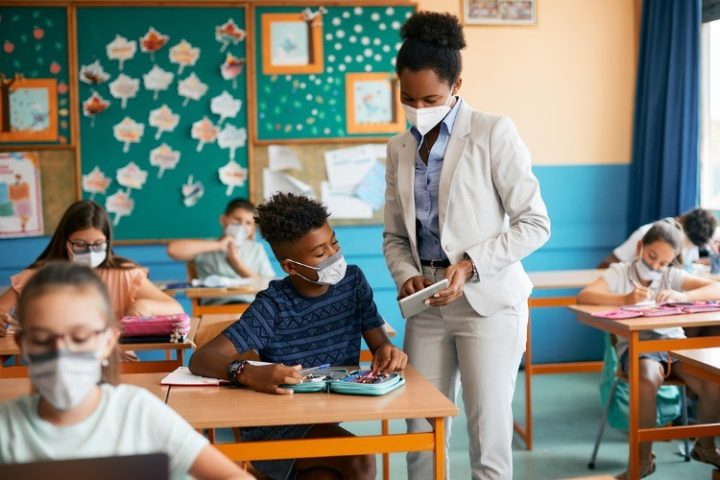
The Fifth U.S. Circuit Court of Appeals restored Texas Governor Greg Abbott’s executive order prohibiting mask mandates in schools on Wednesday after Texas Attorney General Ken Paxton appealed an earlier decision by a federal court that prohibited the order from taking effect.
Governor Abbott signed an executive order on July 29 banning all governmental entities in Texas from mandating masks, prompting the advocacy group Disability Rights Texas to file a lawsuit claiming the governor’s order put disabled children at risk and denied them access to public education.
Kym Davis Rogers, litigation attorney with the group, argued, “No student should be forced to make the choice of forfeiting their education or risking their health.”
Of course, claiming that in order for special-needs students to have equal access to public education, all students must be required to wear masks ignores an entire slew of special-needs students who are negatively impacted by the masking requirements. For example, autistic children struggle immensely with mask-wearing because their neurology makes them more sensitive to having fabric cover their noses and mouths.
In fact, the World Health Organization (WHO) has stated that masks should not be required for children with “developmental disorders, disabilities, or health conditions,” particularly those with sensory issues.
The WHO also advised “children with severe cognitive or respiratory impairments with difficulties tolerating a mask should not be required to wear masks.”
Non-special needs students are also harmed by mask mandates. Many who find the masks uncomfortable are distracted by them, while students who struggle with myopia have difficulty seeing because the masks fog their glasses, a problem that predates COVID for surgeons but is now impacting all glasses-wearers. In fact, face masks have been linked to numerous eye problems. For all students, masks become breeding grounds for pathogens when they are used for too long or become moist. And covering children’s faces can impede verbal and nonverbal communication, language development, and social skills, observed Patricia Rice Doran, Ed.D., an associate professor of Special Education at Towson University.
Doran also noted that pediatric mask-wearing “has been found to have discernible effects” on fear and anxiety, which, she contends, are “not merely ‘inconveniences,’” but can have significant impacts on their short and long-term health.
Sadly, these considerations have been largely ignored by proponents of mask mandates, who have chosen instead to make grand claims about the benefits of mask-wearing with little evidence to support their assertions.
A federal district court ordered a halt to the enforcement of Abbott’s executive order on November 10, allowing schools to enact mask mandates. U.S. District Judge Lee Yeakel determined that the executive order impedes the ability of children with disabilities from participating in public-school programs.
“The spread of COVID-19 poses an even greater risk for children with special health needs,” Judge Yeakel said. “Children with certain underlying conditions who contract COVID-19 are more likely to experience severe acute biological effects and to require admission to a hospital and the hospital’s intensive-care unit.”
But Wednesday’s 15-page ruling from a three-judge panel on the Fifth Circuit Court of Appeals reinstated the ban against school mask mandates, asserting there was “no concrete, or actual or imminent, injury as a result of the enforcement” of Abbott’s executive order.
“The district court’s analysis rests on the faulty premise that the only accommodation available to plaintiffs is their schools’ ability to impose mask mandates,” the panel’s decision stated. Other accomodations include social distancing, voluntary masking, plexiglass dividers, and vaccines.
“The risks of contracting COVID-19 for these plaintiffs are certainly real, but the alleged injury to plaintiffs from the enforcement of [the executive order] is, at this point, much more abstract,” the appeals court said.
The panel asserted Abbott and Paxton would likely win the appeal as the students represented by Disability Rights Texas do not have standing to challenge the ban and have not proven to have exhausted all remedies available to them under the Individuals with Disabilities Education Act, AP News reported.
The panel also took issue with Yeakel’s “blanket injunction” prohibiting the enforcement of Abbott’s order, the Dallas Morning News reported, noting injunctions are meant to be narrowly applied.
Governor Abbott celebrated the court’s ruling on Wednesday, in a tweet declaring “My Executive Order banning mask mandates by gov’t entities is LAW,” but several school districts, including Dallas and Richardson public schools, have declared that they will continue to defy the executive order.
“Dallas ISD’s [Independent School District] mask protocol is still in place,” spokeswoman Robyn Harris said Thursday. “The superintendent and administration are looking at the protocol and will reassess sometime this month.”
Richardson Independent School District (RISD) officials sent a letter to elementary parents on Thursday to say their mask policy would remain in place in spite of the court’s ruling.
“Yesterday’s ruling does not alter RISD’s elementary mask requirement, which previously has been announced to be in place through December 17 as students ages 5-11 have the opportunity to become fully vaccinated against COVID-19 and positive cases in RISD have declined,” it read.
Paxton has sued several school districts that have violated the ban by enacting mask mandates, while some school districts, cities, and counties have sued Abbott over his executive order.





